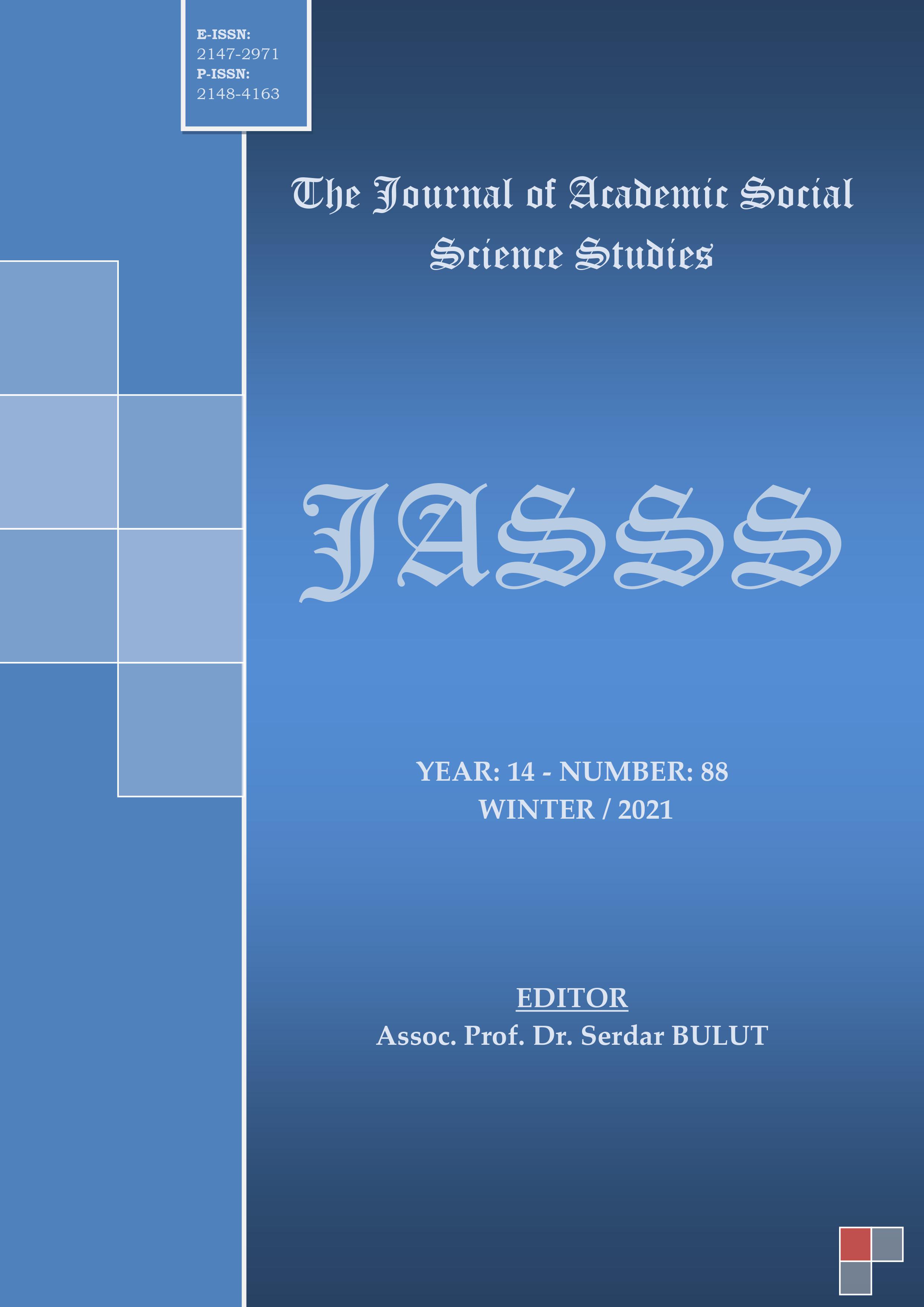Author :
Abstract
Bu çalışma nezaket ifadelerinin, dildeki yansımalarını ortaya çıkarmayı hedeflemektedir. Nezaket algısı çok yönlü bir algı olmakla birlikte, en ilkel kabileden en gelişmiş topluluğa kadar kendine has nezaket durumları veya ifadeleriyle kendini hissettirmektedir. Nezaketin, konuşmanın seyrini olumlu veya olumsuz olarak etkilediği gerçeği yadsınamamaktadır. Bir ifadenin nezaket değeri aslında o ifadenin anlam değerinde de önemli bir rol oynadığı bilinmektedir. Nezaket, yazılı bir kural değildir; fakat bu yazısız olan davranışlar, toplumlarda en az yazılı kurallar kadar önem arz etmektedir. Birtakım nezaket, görgü kurallarınca hareket etmek toplumdaki konumumuza da doğrudan etki edebilmektedir. Bunların yapılmaması sonucunda bir yaptırım cezası ile karşı karşıya kalınmasa bile toplum tarafından dışlanılması, kabul görülmemesine sebebiyet verebilmektedir. Tersi halinde ise nezaket, ahlak sahibi kişilerin de o toplumda yüceltilebileceği görülmektedir. Yaşamımızın her alanında önemli bir kavram olan nezaket, günlük hayatta ilişkilerimizi düzenleyen önemli ve gerekli bir unsur olarak görülmektedir. Bundan dolayı, bu önemli unsurun Türkçenin eski şivelerinden olan eski Uygur Türkçesindeki görünümünün ortaya koyulması amaçlanmıştır. Bu konunun Türkçenin eski dönemlerinde de nasıl işlendiğini görmek adına, eski Uygur Türkçesi şivesine ait olan “Aç Bars” hikâyesi örnekleminde açıklanmaya çalışılmıştır. Bu eser örnekleminden hareketle, yazılı dildeki nezaket incelemesi, Brown ve Levinson’a ait olan bir nezaket kuramı yöntemi ile incelenmeye çalışılmıştır. Bu kuramın seçilmesindeki ana sebep ise birbirinden farklı ve uzak üç dil (Tzeltal dili, Tamil dili ve İngiliz dili) üzerinden oluşturulmuş olmasıdır. Bu birbirinden uzak üç dilde dahi ortak olgular bulunması ve çok farklılıklar görülmemesi, nezaketin evrenselliği noktasında önemli tespitler içermektedir.
Keywords
Abstract
This study aims to reveal the reflections of politeness expressions in the language. While the perception of politeness is a multidimensional perception, it makes itself felt with its own politeness or expressions from the most primitive tribe to the most advanced community. The fact that politeness affects the course of speech positively or negatively cannot be denied. It is known that the politeness value of an expression actually plays an important role in the meaning value of that expression. Politeness is not a written rule; however, these unwritten behaviors are as important as the written rules in societies. Certain politeness and etiquette can directly affect our position in society. Even if they are not faced with a sanction penalty as a result of not doing so, their exclusion by the society may cause inadmissibility. Otherwise, it is seen that politeness and moral people can be glorified in that society. Politeness, which is an important concept in every area of our lives, is seen as an important and necessary element that regulates our relations in daily life. Therefore, it is aimed to reveal the appearance of this important element in the old Uighur Turkish, which is one of the old dialects of Turkish. In order to see how this subject was handled in the old times of Turkish, it was tried to be explained in the sample of “Aç Bars” story belonging to the old Uighur Turkish dialect. Based on this work sample, politeness examination in written language was tried to be examined by a politeness theory method that belongs to Brown and Levinson. The main reason for choosing this theory is that it was created through three different and distant languages (Tzeltal language, Tamil language and English language). The fact that there are common facts even in three distant languages and that there are not many differences involves important determinations in the universality of politeness.
Keywords
- Akar, Ali. (2005). Türk Dili Tarihi. İstanbul: Ötüken Neşriyat.
- Arslan, Begüm. (2019). “Türk Dilinde Soru ve Nezaket”. Uluslararası Toplum ve Kültür Araştırmaları Sempozyumu Tam Metin Bildiriler Kitabı. Ed. Doç Dr. Mustafa Aça. 204-210. Çanakkale: Toplum ve Kültür Araştırmaları Derneği Yayınları.
- Aydemir, Adem. (2014). Divanü Lûgati’t- Türk’e Göre İnsanlar Arasındaki İlişkilerde Nezaket. Uluslararası Türkçe Edebiyat Kültür Eğitim Dergisi, 3(3), 14-36.
- Aysal, Beyhan. (2018). Bir Eğitim ve Araştırma Hastanesinde Görev Yapan Hemşirelerin Nezaket Kavramına İlişkin Görüşlerinin Belirlenmesi. Yüksek Lisans Tezi. İstanbul: Okan Üniversitesi, Sağlık Bilimleri Enstitüsü.
- Brown, P. – Levinson, C. Stephen. (1987). Politeness: Some Universals in Language Use. Cambridge: Cambridge University Press.
- Bulut, S. (2018). Eski Uygur Türkçesinde Türkçe Bitki Adlandırmaları -1: Yiyecek-İçecek Olarak Kullanılan Bitkiler. TÜRÜK-Uluslararası Dil, Edebiyat ve Halkbilimi Araştırmaları Dergisi, 6(2), 562588.
- Caferoğlu, Ahmet. (1984). Türk Dili Tarihi I. 2 Cilt (3. Basım). İstanbul: Enderun Yayınları.
- Culpeper, Jonathan. Impoliteness: Using Language to Cause Offence. Cambridge: Cambridge University Press, 2011.
- Dereli, Sevgi. (2008). Sözlü İletişimde Nezaket Stratejileri, Türkbilig, 0(15), 24-52.
- Ercilasun, A. Bicam. (2015). Başlangıçtan Yirminci Yüzyıla Türk Dili Tarihi (16. Basım). Anlara: Akçağ Yayınları.
- Goffman, Erving. (1967). Interactional Ritual: Essays on Face-to-face Behavior. New York: Anchor Books.
- Gömeç, Saadettin. (2011). Uygur Türkleri Tarihi (4. Basım). Ankara: Berikan Yayınevi.
- Gulcalı, Zemire. (2015). Eski Uygurca Altun Yaruk Sudur’dan “Aç Bars” Hikâyesi (2. Basım). Ankara: Türk Dil Kurumu Yayınları.
- Karamanlıoğlu, A. Fehmi. (2002). Türk Dili (5. Basım). İstanbul: Beşir Yayınları.
- Kádár, D. Zoltán – Haugh, Michael. (2013). Understanding Politeness. Cambridge: Cambridge University Press.
- Keser, B. Meliha. (2018). Nezaket, Nezaket Teorileri ve Türkçede Kullanılan Nezaket Kavramları. TÜRÜK Uluslararası Dil, Edebiyat ve Halkbilimi Araştırmaları Dergisi, 6(15), 127-138.
- Leech, Geoffrey N. (1983). Principles of Pragmatics. London: Longman.
- Leech, Geoffrey N. (2014). The Pragmatics of Politeness. Oxford: Oxford University Press.
- Nazlı, Ece H. (2018). Türkçe Özür İfadelerinin Toplumdilbilimsel Analizi (Dicle Üniversitesi Örneği). Dicle Üniversitesi Sosyal Bilimler Enstitüsü Dergisi, 10(21), 143-159.
- Ortaköylü, Hale. (2019). Türkçe ve İngilizce Rica Etkileşimlerinde Kibarlık ve Kabalık Görünümleri. Doktora Tezi. Ankara: Ankara Üniversitesi, Sosyal Bilimler Enstitüsü.
- Onursal Ayırır, İrem. Türkiye Türkçesinde Kalıp Sözler: Nezaket Kuramı Açısından Edimbilimsel Bir Değerlendirme. Millî Folklor, 126 (Yaz 2020), 86-98.
- TDK, Türk Dil Kurumu. “Nezaket”. Erişim 20 Mayıs 2020. https://sozluk.gov.tr
- Uçar, İlhan. (2012). Kutadgu Bilig’de Beden Dili. Turkish Studies, 7/4, 3045-3058.
- Uçar, Melike. (2016). Aç Bars Hikâyesinde Bütün, Hepsi, Tam, Anlamlarına Gelen Kelimelerin Eşanlamlılık Dizilimi. Türkbilig 31, 97-108.
- Yaylagül, Özen. (2005). Eski Türkçede Nezaket İfadeleri. Milli Folklor, 17(68), 151-165.
- Yule, George. (2010). The Study of Language (4.Edition). Cambridge: Cambridge University Press.
- Watts, Richard J. (2003). Politeness. Cambridge: Cambridge University Press.
